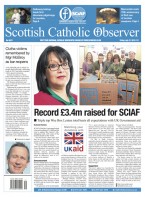BY Ian Dunn | November 16 | ![]() 0 COMMENTS
0 COMMENTS ![]() print
print

Graver danger than the drugs trade
— SCIAF-backed human rights activists’ warning over funding of illegal mining in Colombia
Colombian human rights activists supported by the Scottish Catholic International Aid Fund (SCIAF) have warned that a recent rush of illegal mining activity, funded by British firms, could do more damage to their country than the cocaine trade.
Alex Ginanga and Robert Daza visited Scotland last week to help publicise a new report, Giving It Away: the consequences of unsustainable mining policy in Colombia, which has been produced by
SCIAF-funded advocacy organisation ABColombia.
The report reveals that the Colombian Government’s hunger to lure foreign companies into a new ‘gold rush’ for precious minerals is leading to serious human rights violations and environmental damage.
Damage
Mr Ginanga, of Colombian indigenous Awa people said the damage caused to Colombia by unscrupulous mining companies could be even more serious than that if the drug trade.
“It could be much, much more serious because the areas used for mining can be completed destroyed, The rivers entirely polluted so nothing will grow,” he said. “My people have lived in these places for generations and mining could end that.”
Mr Guevara, who works with campesinos—agricultural workers—said that the money involved in illegal mining in Colombia was attracting many of the violent men who had been involved in the drug trade and who the mining companies used to attack protestors.
“There has been a lot of violence around mining companies,” he said. “In June last year an unknown group shows up and shot nine campesinos.”
Both men have also braved considerable personal danger to keep fighting for their people.
Mr Guevara was forced to leave his home in 2002 for three years and after he was put on a death list by a paramilitary group. Mr Ginanga’s human rights organisation frequently receives death threats and last year a car he was traveling in was shot repeatedly.
Support for report
SCIAF is one of five charities who are supporting the ABColombia group which has produced this new study.
It focuses on the Colombian Government’s rapid expansion of its economy based on the mining of coal, gold and copper. Their goals for 2021 are to double coal exports, quadruple gold and triple the mining sector but this report say 35 per cent of Colombian territory is at risk from mining and 64 groups of indigenous people and that about 40 per cent of Colombia’s drinking water is at risk of contamination.
The report’s author, ABColombia’s Programme and Advocacy Manager Louise Winstanley said she hoped the report will put pressure on the UK-registered firms are some of the largest investors in Colombia’s mining sector.
“UK companies starting to invest in the Colombian mining sector face reputational risks through inadvertent complicity in human rights abuses unless they take direct responsibility for ensuring that the rights of local people where they intend to mine have been upheld,” she said. “Companies currently mining in Colombia also appear to be exploiting weak governmental institutions to make even higher profits through tax evasion.”
SCIAF’s concerns
Mark Camburn, SCIAF’s programme officer for Latin America and Haiti recently returned from Colombia and said SCIAF were very worried about the situation.
“The equivalent of the population of Scotland, 5.2 million people, has been forcibly evicted from their land or has fled organised violence over many years in Colombia,” he said. “We are extremely concerned about the growing impact of mining on these vulnerable communities as they have already suffered so much. UK-listed companies must be extremely careful that their drive for profit does not add to the further abuse of human rights of the long-suffering people of Colombia.”











